I am on record as stating that Dr. Martin Luther King is not the only hero of the civil rights movement. King did not do it by himself—indeed, the process began long before he was born—but he deserves a lot of credit. I admire and respect him for multiple reasons. A man of courage and vision, he was a true leader. I wish I had been among the 1,200 people present when he spoke at the University of Texas on March 9, 1962 (after the Montgomery bus boycott and before his showdown with Bull Connor in Birmingham), but I would not reach Austin until 1971.
Regardless of my high esteem for King, I know he was no angel. This is not because he was a world-class adulterer; such information comes largely from wiretaps conducted by J. Edgar Hoover’s FBI, for which Attorney General Robert Kennedy gave approval. No, the issue is a bugaboo that has wrecked many an academic career: plagiarism.
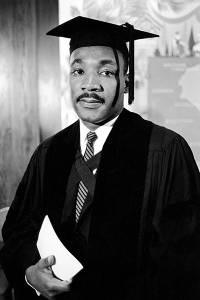 King was unquestionably a smart guy, but he maintained just a C+ average during his undergraduate days at Morehouse College (a black institution). He was considered an academic underachiever in Atlanta. So it is curious that he immediately became an A- student when he went to Crozer Theological Seminary (a mostly white institution) in Pennsylvania to seek a divinity degree. It was more of the same at Boston University as he got top grades in pursuit of a Ph.D. He graduated from Crozer in 1951 and BU in 1955. Some critics/enemies have all but accused the latter two schools of pampering King, doing so out of white guilt and an early version of “affirmative action.” I am unconvinced, because the professors and administrators could not have known the young man was destined to be such a titanic figure in modern American history. In the early 1950s, he was just an earnest student, one with a promising future in the pulpit. So perhaps he earned all those A’s.
King was unquestionably a smart guy, but he maintained just a C+ average during his undergraduate days at Morehouse College (a black institution). He was considered an academic underachiever in Atlanta. So it is curious that he immediately became an A- student when he went to Crozer Theological Seminary (a mostly white institution) in Pennsylvania to seek a divinity degree. It was more of the same at Boston University as he got top grades in pursuit of a Ph.D. He graduated from Crozer in 1951 and BU in 1955. Some critics/enemies have all but accused the latter two schools of pampering King, doing so out of white guilt and an early version of “affirmative action.” I am unconvinced, because the professors and administrators could not have known the young man was destined to be such a titanic figure in modern American history. In the early 1950s, he was just an earnest student, one with a promising future in the pulpit. So perhaps he earned all those A’s.
With the passage of 34 years, however, King’s academic achievements were thrown into doubt. It began with an article by British journalist Frank Johnson entitled “Martin Luther King—Was He a Plagiarist”? in the December 3, 1989 issue of the Sunday Telegraph. Johnson showed that large sections of King’s dissertation, A Comparison of the Conception of God in the Thinking of Paul Tillich and Henry Nelson Wieman, had been lifted from a dissertation done by another BU student (Jack Boozer) three years earlier. This information may have come to Johnson from Stanford University’s King Papers Project. As those papers, donated by Coretta Scott King, were being organized and catalogued, staffers took note. It was an explosive revelation, possibly leading the people at Stanford to keep quiet. But Johnson wrote his 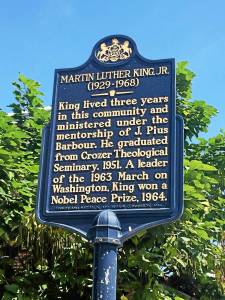 story, followed by others in the Wall Street Journal, the New York Times and other publications. Boston University began an investigation that confirmed it and more. King had a long habit of copying without attribution. There was an unmistakable pattern of appropriation, which begs the question of whether King’s academic advisors at BU (Drs. L. Harold DeWolf and S. Paul Schilling) saw it and let it slide.
story, followed by others in the Wall Street Journal, the New York Times and other publications. Boston University began an investigation that confirmed it and more. King had a long habit of copying without attribution. There was an unmistakable pattern of appropriation, which begs the question of whether King’s academic advisors at BU (Drs. L. Harold DeWolf and S. Paul Schilling) saw it and let it slide.
When Boozer was informed in 1988 that much of his dissertation had been copied, he was stunned but not really upset. A careful academic who put a high value on scholarship, he hoped the issue would just go away. Boozer was a native of Alabama and supporter of the civil rights movement, and thought of MLK as a friend and colleague. His wife said he was willing to dismiss it as a minor matter, nothing more than King’s failure to use footnotes.
King’s dissertation was not revoked, as happened with many other scholars who had been caught cheating. Instead, in 1991 a letter was placed in the file holding it in the BU library—barely even a slap on the wrist. It emphasized that King’s dissertation, faulty though it was, made a valuable contribution to academe. His reputation at Boston University was unsullied. A plaque adorns a house King lived in during his student days, and there are symposia, professorships (the Martin Luther King Chair in Social Ethics, for example) and honors galore. BU fully embraces this distinguished alumnus.
Some people, of course, were appalled. King had committed a graduate student’s cardinal sin: taking the ideas and words of another scholar verbatim and presenting them as his own. None of this came to light until long after his death by assassination in April 1968. King’s final 13 years were hectic and pressure-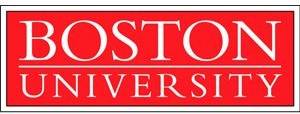 filled, and he had other things on his mind. Some defenders—most notably Dr. Keith Miller of Arizona State University—have bent over backward to minimize, justify and excuse his transgressions. That got harder when it was proven that the closing section of King’s “I Have a Dream” speech in Washington, D.C. in 1963 closely resembled Archibald Carey’s address at the 1952 Republican convention. In 1962, King was at a service outside a church in Georgia that had been burned by the Ku Klux Klan. A fellow civil rights activist, Prathia Hall, uttered a spontaneous prayer in which she rhythmically repeated the phrase “I have a dream.” In February 1968 at Ebenezer Baptist Church in Atlanta, King issued a sermon of great rhetorical power he called “Drum Major Instinct” in which he seemingly delivered his own epitaph. But several multi-sentence segments could be found in sermons given years before by a white liberal minister named J. Wallace Hamilton. As a final example, his 1963 “Letter from Birmingham Jail” borrows heavily from Harry
filled, and he had other things on his mind. Some defenders—most notably Dr. Keith Miller of Arizona State University—have bent over backward to minimize, justify and excuse his transgressions. That got harder when it was proven that the closing section of King’s “I Have a Dream” speech in Washington, D.C. in 1963 closely resembled Archibald Carey’s address at the 1952 Republican convention. In 1962, King was at a service outside a church in Georgia that had been burned by the Ku Klux Klan. A fellow civil rights activist, Prathia Hall, uttered a spontaneous prayer in which she rhythmically repeated the phrase “I have a dream.” In February 1968 at Ebenezer Baptist Church in Atlanta, King issued a sermon of great rhetorical power he called “Drum Major Instinct” in which he seemingly delivered his own epitaph. But several multi-sentence segments could be found in sermons given years before by a white liberal minister named J. Wallace Hamilton. As a final example, his 1963 “Letter from Birmingham Jail” borrows heavily from Harry 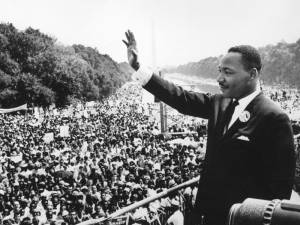 Emerson Fosdick. (Speeches, sermons and letters, needless to say, should not be confused with doctoral dissertations, so I cut King some slack here.)
Emerson Fosdick. (Speeches, sermons and letters, needless to say, should not be confused with doctoral dissertations, so I cut King some slack here.)
Simply put, King was wrong to borrow/steal from Boozer in 1955. He was a sloppy academic, and of that there can be no doubt. But it is a relatively—note that modifier—unimportant issue in light of his life’s work. King, whose great-grandfather was a slave preacher, has been called with good reason the most outstanding theologian America has ever produced. When his house was bombed by segregationists soon after the Montgomery bus boycott, angry supporters gathered and called for a response in kind. The good reverend, arrested 20 times and assaulted four times in his career, calmed them by quoting Jesus: “Love your enemies, bless those who curse you and pray for those who spitefully use you”; his 1964 Nobel Peace Prize was well deserved. What King did in leading the civil rights movement is such that his shortcomings as a grad student and his sexual escapades can be forgiven. It’s not that he had feet of clay, but he was human like the rest of us.

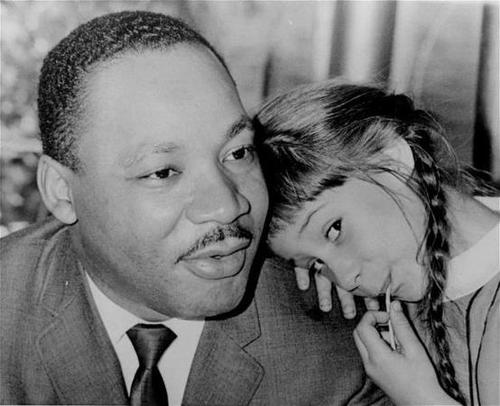
16 Comments
I believe…that’s another repetitious phase I attribute to the MLK era and even to the man himself. Whether he actually said it or I just think that he said it, is not pertinent to the fact that his speeches made America believe that we in fact just love our neighbor.
What a leader in his message proclaimed.
You have brought forth good info about his message lived and it is sad to know that he plagiarized portions of his doctorate. I am prone to forgive him since I know that I too have failed, yet my great desire is to inspire others to greatness, to oneness, to brotherly love and he was gifted and good at it.
Thanks for the article. I
King stole far more than two-word phrases, but your point is valid. I hope I made clear that he is deserving of forgiveness for this lapse in judgement during his days as a grad student (although, as indicated, he kept doing it and doing it).
I know there’s another side about the Martin Ruther king. I enjoyed reading an interesting essay about other issues behind altruism. As a graduate student, I realize how long my work will keep stored.! Right before the coms exam, thank you for delivering a good message.!
Yes, even the greatest among us (such as King) are not perfect.
Richard-That was very interesting. I heard about his plagiarism, probably back when it made the news. He was a great but flawed man. This reminded me of Joe Biden’s plagiarism (of Neil Kinnock) which caused him to drop out of the 1988 presidential race.
Great but flawed–you said it well, Kevin.
I read your article on Dr. Kim. Excellent discovery and investigation. Shame on Dr. King. His doctgoral degree must have revalued and reconsidered. He should have apologied for his stealing somebody’s thesis. Great discovery and reevaluations on Dr. King, Yong Yoon
Thank you, Mr. Yoon. I do believe we have to be honest about people, even great ones like King. He knew he was not perfect. In some of his speeches and sermons, he talked about himself as a “sinner.”
I am amazed. Universities, in my experience are very rigid when it comes to academic ethics. What happened in the case of MR King raises the opposite issue of racial bias, almost worse in that they were patronizing him by forgiving these things. At this very moment, people are tearing down icons of figures of history because despite their positive accomplishments in life, they had a period that resulted in darker consequences. If you are going to apply this standard, you apply it equally. I revoke your doctorate , sir if no one else will.
To say BU gave him a pass is a huge understatement. And I have gotten a lot of slack for writing this piece, as if I slandered Dr. King.
Thank you for this article. Rev. Dr. Martin Luther King Jr. was great. I think of him as well read. I also think of the oral tradition from cultures that did not have access to education like most academics do. Many black preachers in American history could not read. They could, however, repeat what they heard – and very powerfully. Academics could call Rev. Dr. Martin Luther King Jr. flawed, but it’s flawed by whose standards? I call him great for using his gifts – and his entire life – to make this world a better place.
And, yes, I do believe in flawed leaders. I am Lutheran. We are simultaneously saints and sinners. “simul justus et peccator” (Was it Martin Luther who first said that?)
I came across this article looking for who he got the sermon “love your enemies” from, so I could mention it in my sermon. 🙂 I appreciate the author understands the difference between academic papers and preaching. I plagiarize Jesus and the Bible all the time when I preach!
Academic plagiarism cannot be condoned, no way, no how.
Dear Mr. Pennington:
“Academic plagiarism cannot be condoned, no way, no how.”
Trouble is, that’s exactly what Boston U has done. ‘Note in the file’ = slap on the wrist. Had this dissertation been signed Gregory Koster—or even Michael Pennington—, the degree would have been revoked, any academic career wrecked, and figuratively speaking, we’d be soaring into the sky, with a size 12 bootprint on the rump.
The argument that King’s later work is of such value that the dissertation must be ‘quarantined’ is the same argument Henry VIII of England could have made, in breaking away from the Catholic church:
“If you, the Pope don’t give me a pass on marrying the woman I (at this moment) want, I’ll have to secede from the church and set up my own. Otherwise, I won’t be able to sire a heir, and when I die, a civil war may break out. So for the good of the nation, I must be allowed to fool around as I please.”
Today, no one would buy that casuistical argument. Why? Not because it is wrong, and corrupting to the figurative rule of law. It won’t be bought because Henry VIII is not a member of an approved victim group. But Martin King is, and he gets a pass, not least because those who have to power to settle obloquy on him, e.g. Boston University, would suffer immensely from the flareback.
Learning about King’s plagiarism was and is, disillusioning. Had his plagiarism been revealed before his death, it would have damaged the work he was trying to do, depending on when it was revealed. I am obliged for your article, which showed me MLK continued to steal the ideas and words of others. Bring on the disillusionment again! But if the scholarly King was a fraud, deserving of contempt, the preacher and activist were and are magnificent, showing action and conduct worthy of the highest praise. It is not wise to demand perfection, even of an ideal. King’s degree should be revoked. Even with the furor this would generate, King would still be worthy of what was said about Sir Christopher Wren, architect of 1600s London:
If you would see his memorial, look around you.
Many thanks for looking at this late contribution.
Gregory, thank you so very much for reading and making such comments. I agree with them all. I mentioned in one of my replies above that I have gotten a lot of flak (misspelled “slack”) for having written this article. I lost one friendship, which I think is absurd. This former friend was shocked that I would dare say a non-flattering word about the sainted King. Well, sorry, I told the former friend. I tell the truth and let the chips fall.
Blacks will generally don’t care that he plagiarized. This issue has been hidden for a long time, and it is because he is a black icon. And blacks view any critique of a black icon as racism. And many liberal whites will not cover the story, as they don’t want to get accused of racism.
Correct, but you merely restated what I said in the article.
Add Comment